What is the Perpetual calendar 2026 - the lunar and Gregorian calendar 2026? Shall the VAT threshold for household and individual businesses increase in Vietnam?
What is the Perpetual calendar 2026 - the lunar and Gregorian calendar 2026?
The Perpetual Calendar has long been an important tool, helping people to look up dates, view the lunar and Gregorian calendar, and select auspicious times for significant activities such as weddings, groundbreaking ceremonies, openings, or rituals. By combining science with traditional culture, the Perpetual Calendar is not only a time lookup table but also encompasses profound feng shui values.
The year 2026, the year of Binh Ngo, symbolizes strength, freedom, and breakthroughs, marking a uniquely significant year in the heavenly stems and earthly branches cycle. The Perpetual Calendar 2026 will help us explore the correlation between the lunar and Gregorian calendar, while also providing detailed information on auspicious and inauspicious days, solar terms, and important times throughout the year.
Below is the Perpetual Calendar 2026 - View the lunar and Gregorian calendar 2026 with all detailed months:
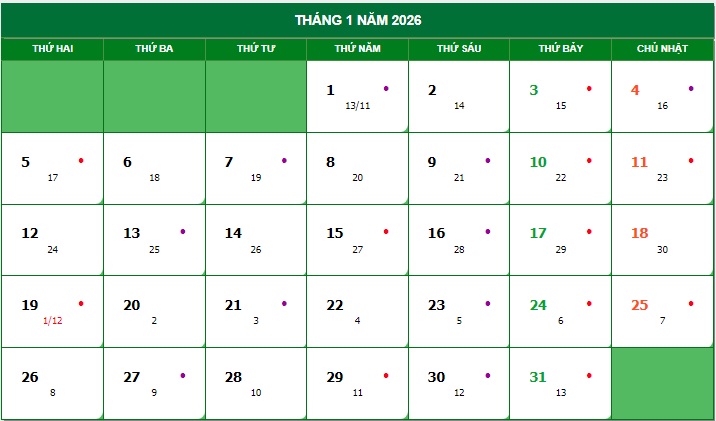
Perpetual Calendar 2026 - January
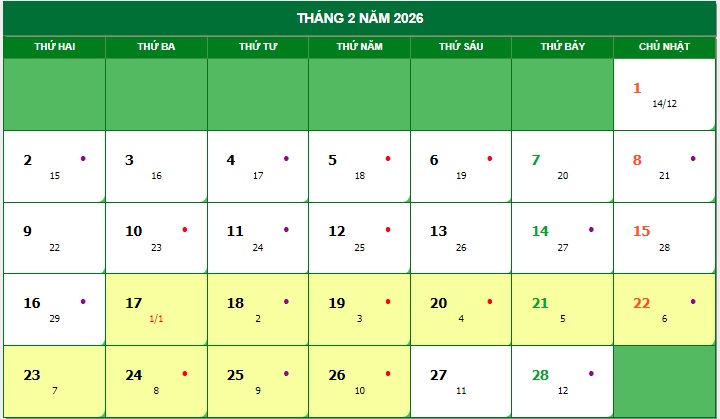
Perpetual Calendar 2026 - February
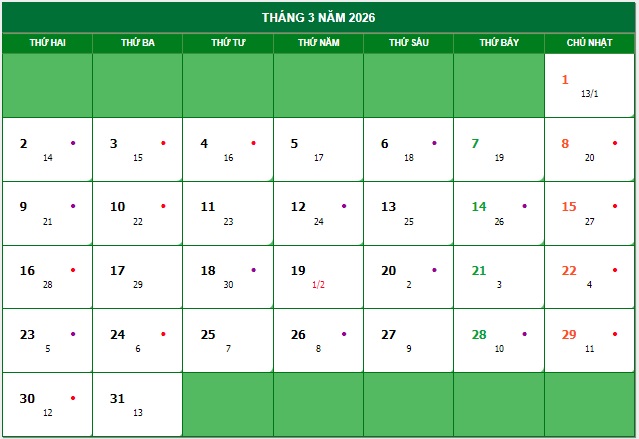
Perpetual Calendar 2026 - March
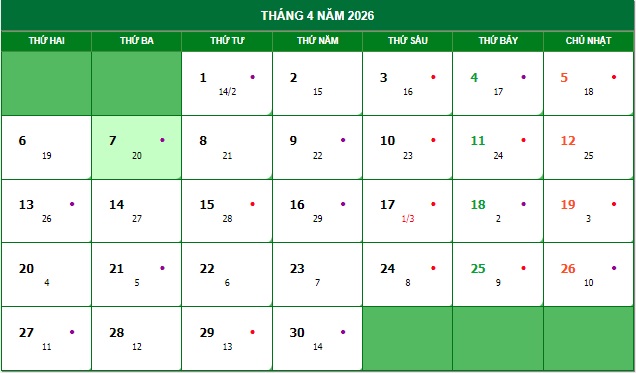
Perpetual Calendar 2026 - April
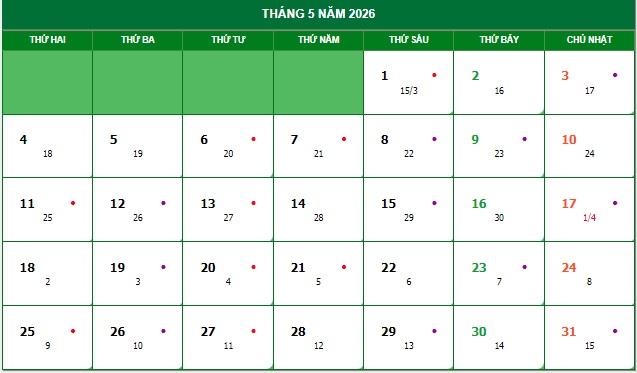
Perpetual Calendar 2026 - May
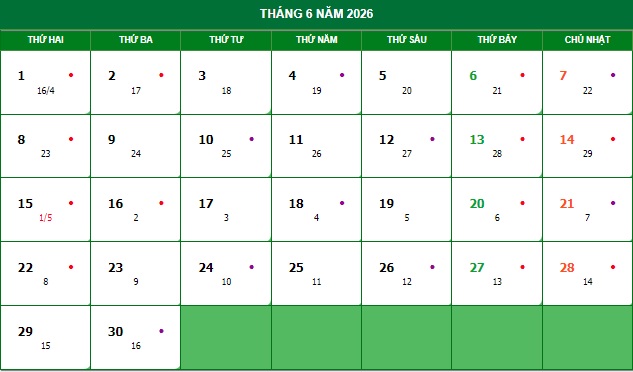
Perpetual Calendar 2026 - June
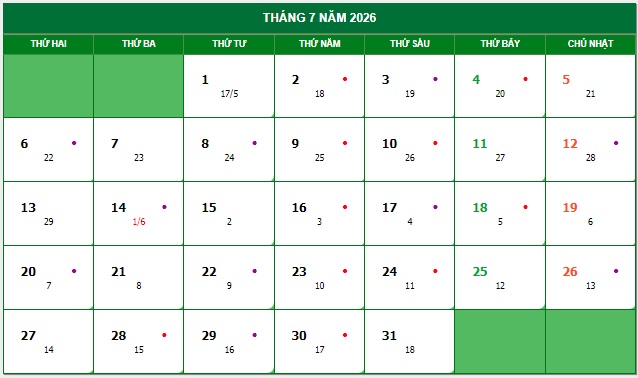
Perpetual Calendar 2026 - July
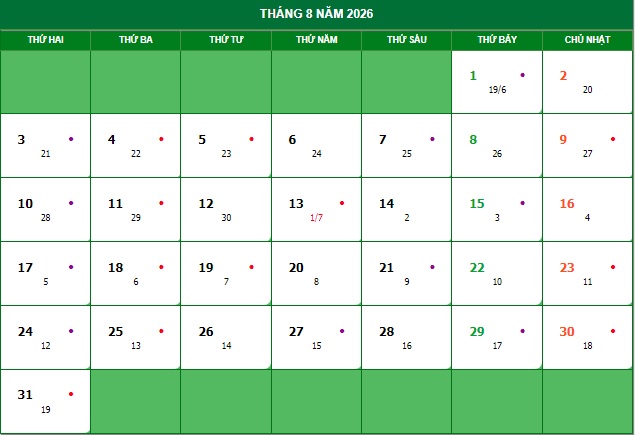
Perpetual Calendar 2026 - August
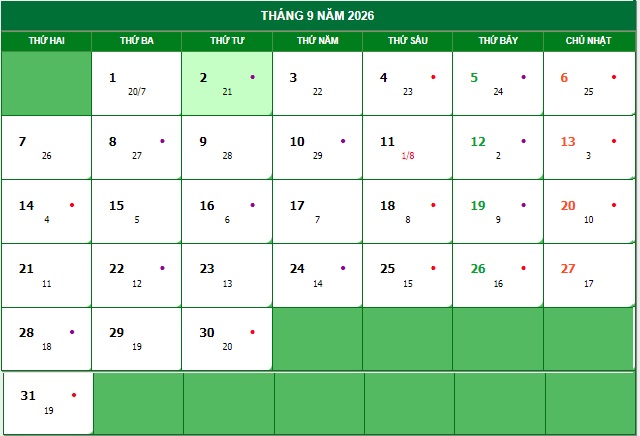
Perpetual Calendar 2026 - September
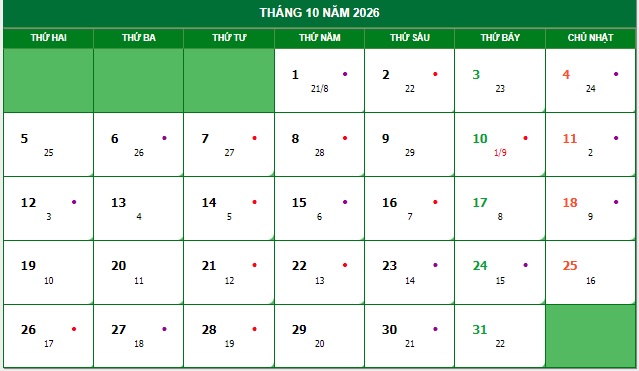
Perpetual Calendar 2026 - October
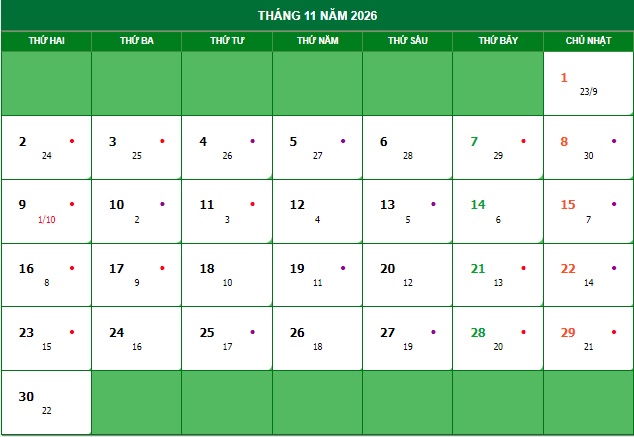
Perpetual Calendar 2026 - November
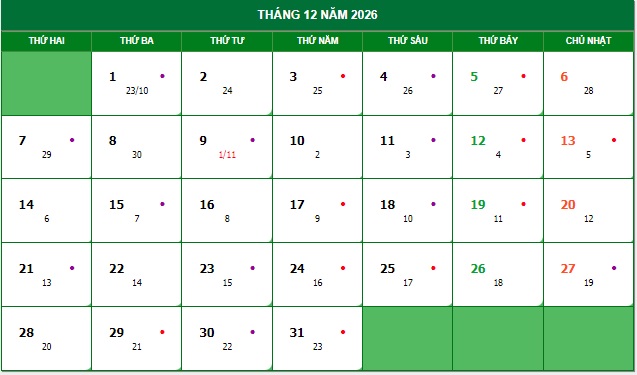
Perpetual Calendar 2026 - December

What is the Perpetual calendar 2026 - the lunar and Gregorian calendar 2026? (Image from Internet)
From 2026, shall the VAT threshold for household and individual businesses increase in Vietnam?
Pursuant to Clause 25, Article 5 of the Value Added Tax Law 2024 (effective from July 1, 2025), the regulation on subjects not subject to value added tax is as follows:
Non-taxable subjects
...
- Goods and services produced and traded by households and individuals with annual revenue not exceeding 200 million VND; assets of organizations, individuals not engaged in business, not VAT payers for sales; national reserve goods sold by the national reserve agency; fees and charges collected under the law on fees and charges.
...
Simultaneously, pursuant to Clause 2, Article 18 of the Value Added Tax Law 2024 regarding the effective date of the Value Added Tax Law 2024 as follows:
Effective date
...
- Regulations on the revenue level of household and individual businesses subject to non-taxation under Clause 25, Article 5 of this Law and Article 17 of this Law shall take effect from January 1, 2026.
...
Therefore, starting from January 1, 2026, household and individual businesses with annual revenue exceeding 200 million VND are required to pay value added tax.
What is the basis for VAT calculation for individual businesses?
According to Article 10 of Circular 40/2021/TT-BTC, the basis for VAT calculation for individual businesses is stipulated as follows:
The tax basis for household businesses and individual businesses is taxable revenue and the tax rate on revenue.
(1) Taxable Revenue
The VATable revenue for individual businesses is the revenue including tax (for taxable cases) from the entire sale of goods, processing, commissions, service provision during the tax period from business activities, including bonuses, support to achieve sales, promotions, trade discounts, payment discounts, monetary or non-monetary support; price subsidies, surcharges, additional receipts in accordance with regulations; compensation for contract breaches, other compensations (counted only in the personal income tax revenue); other revenue individual businesses are entitled to, regardless of whether money has been collected or not.
(2) Tax Rate on Revenue
- The tax rate on revenue includes detailed VAT rates applied to each field or sector as guided in Appendix 1 issued with Circular 40/2021/TT-BTC.
- In cases where an individual engages in multiple fields, sectors, the individual business must declare and calculate tax according to the revenue tax rate applied to each field or sector. If the individual business cannot determine the taxable revenue for each field or sector or determines it inconsistent with actual business activities, the tax authority shall determine the taxable revenue for each field or sector according to tax management regulations.
What are regulations on the tax calculation method for individual businesses paying VAT according to the declaration method in Vietnam?
Based on Article 5 of Circular 40/2021/TT-BTC, regulations on the tax calculation method for individual businesses paying VAT according to the declaration method are as follows:
- The declaration method applies to large-scale individual businesses; and individual businesses not yet reaching large-scale but choosing to pay tax via the declaration method.
- Individuals paying tax by the declaration method must conduct monthly tax declarations, except for new individual businesses and those meeting quarterly tax declaration criteria and opting for quarterly declarations as per Article 9 of Decree 126/2020/ND-CP.
- If an individual business paying tax via the declaration method identifies taxable revenue not corresponding with real operations, the tax authority will determine the taxable revenue per Article 50 of the Tax Management Law 2019.
- Individual businesses paying tax via the declaration method must conduct accounting and invoicing policies, except for certain fields or sectors where revenue can be determined based on validation by competent authorities.
- Individuals paying VAT by declaration are not required to conduct a tax finalization.

